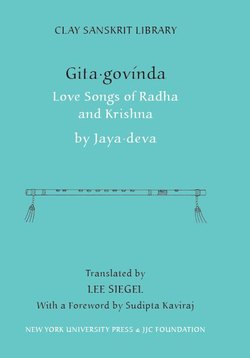Читать книгу Gita Govinda - Jayadeva - Страница 13
На сайте Литреса книга снята с продажи.
Оглавлениеis drenched by remembering Krishna (yadi Hari/smarane sarasam mano, 1.3) and who has a curiosity about the in-exhaustible playfulness of worldly love (yadi vildsa/kalasu kutuhalam, ibid.). Readers, in this imperfect world, might come with only one intention; but there is a subtle suggestion that his poem has the transformative capacity of transferring the reader whose curiosity is mundane to the higher curiosity about god’s nature; and against conceptions of ascetic devotion, it also promises that devotees with a mere dry reverence for Hari might also thrill at the joys of worldly love. Against the anemic visions of asceticism, the devotee is taught the central place of erotic love in human life, and its appropriate settings in a blooming nature, describing acts of love with the immense naivete common to all great art. The love between Radha and Krishna is described as if it were happening for the first time, and as if this happening will go on for ever. There is a strange spareness to the story: nothing much happens except for Radha’s suffering at being separated from Krishna, Krishna’s realization that without Radha he was unfulfilled even when surrounded by hundreds of gopis, his contrite return to Radha (tatyaja Vraja/sundarih, 3.1), his celebration of her beauty, and their union. The poet wants to leave them an eternity to enjoy themselves on the banks of the Yamuna (Yamuna/kule rahah/kelayah, 1.1). By this shift, the “Gita·govinda,” with other Vaishnava texts, achieves a fundamental transformation of how Vaishnavas conceived of God: instead of a single male figure, godliness is vested in the dual figure of Radha and Krishna.
